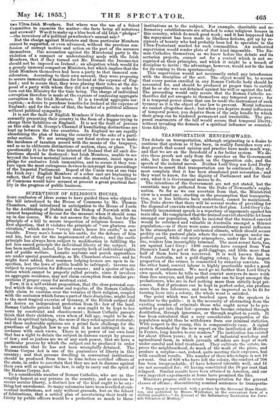SUPERVISION OF RELIGIOUS HOUSES.
BOWE confusion of ideas seems to have guided those who object to the bill introduced to the House of Commons by Mr. Thomas Chambers, and introduced in anticipation to the House of Lords by the Archbishop of Dublin and the Bishop of Norwich with an earnest bespeaking of favour for the measure when it should come up in due course. We do not answer for the details, but for the principle of a bill to secure inspection of religious houses. The first objection, that it violates the principle of "our glorious con- stitution," which makes "every man's house his castle," is not tenable. Every man's house is his castle, for the defence of him and his, but not for the imprisonment of others ; and the castle principle has always been subject to modification in fulfilling the not less sacred principle the individual liberty of the subject. It has been modified, indeed, for the security both of individual rights and of public welfare. Lunatic asylums and parish apprentices are under special guardianship, as Mr. Chambers observes ; and he might have added, that common lodging-houses are open to in- spection, lest the laws of public health be infringed; taverns are subject to supervision for different reasons ; and a species of insti- tution which cannot be properly called private, since it involves an aggregate residence, may not claim exemption from similar pre- cautions if proper cause for mistrust exist. Now it is a self-evident proposition, that the close personal con- trol which the clergy, secular and regular, of the Roman Catholic faith claim to exercise over the votaries of their religion, coupled with the seclusion which forms a part of their discipline, might lead to the most tragical exercise of tyranny, if the British subject did not derive an independent protection from th:.• law of the land. Roman Catholic priests hold that a nun ought to be kept to her vows by constraint and chastisement ; Roman Catholic parents think that their children, even when of full age, ought to be de- tained in spiritual tutelage, the more if they rebel against restraint; and these undeniable opinions are a prima facie challenge for the guardians of English law to see that it be not infringed in ac- cordance with such views. There is no power of our own land that has a right to detain the subject in duresse except by process of law • and so jealous are we of any such power, that we have a particular process by which the subject can be produced in order to ascertain that he has not been wrongfully detained. The Habeas Corpus Act is one of the guarantees of liberty in this oduntry ; and that persons dwelling in conventual institutions should be produced from time to time before certified officers of the state, in order to ascertain that they are not in dunsse against their own will or against the law, is only to carry out the spirit of the Habeas Corpus Act.
To a considerable number of Roman Catholics, who are as tho- roughly honest as any persons in the country, and as anxious to secure secular liberty, a distinct law of the kind ought to be any- thing but unwelcome. So many calumnies have been levelled at con- ventual institutions, not only without grounds, but on the falsest of fabrications, that a settled plan of ascertaining their truth or falsity by public officers would be a protection as much to those
institutions as to the subject. For example, charitable and re- formatory establishments are attached to some religious houses in this country, which do muchwork ; and it has happened that the repayment has been maAC'ex'lln libellous fictions, got up by re- cipients of bounty who had probably been led to speculate in the Ultra-Protestant market for such commodities. An authorized supervision would render plots of that kind impossible. The Ro- man Catholics themselves, as we knew before the debate and its sectarian projects, cannot ask for a control which is not re- cognized on their principles, and which it might be a breach of discipline to invite : the advantage, however, would not be the less for its coming to them spontaneously.
This supervision would not necessarily entail any interference with the discipline of the sect. The object would be, to secure that every person enrolled in any Roman Catholic body should be accounted for, and should be produced at proper time to certify that he or she was not detained against his will or against the law. The proceeding would only secure that the Roman Catholic au- thorities did not arrogate to themselves any temporal power; for it is temporal power alone that can be made the instrument of such tyranny as it is the object of our law to prevent. Moral influence we cannot altogether meet; but when you deprive moral influences of temporal power, you deprive them of the only handle by which their grasp can be rendered permanent and irresistible. The pro- posed enactments of the bill would secure that temporal liberty, without invading the domain of a spiritual influence or conscien- tious fidelity.


























 Previous page
Previous page